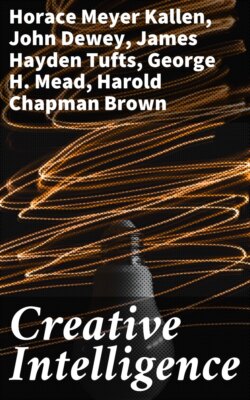Creative Intelligence

Реклама. ООО «ЛитРес», ИНН: 7719571260.
Оглавление
Джон Дьюи. Creative Intelligence
Creative Intelligence
Table of Contents
THE NEED FOR A RECOVERY OF PHILOSOPHY
JOHN DEWEY
I
II
III
IV
V
REFORMATION OF LOGIC
ADDISON W. MOORE. I
II
III
IV
INTELLIGENCE AND MATHEMATICS
HAROLD CHAPMAN BROWN
I. Beginnings of Arithmetic and Geometry
II. The Progress of Self-conscious Theory
III. Contemporary Thought in Arithmetic and Geometry
IV. Things, Relations, and Quantities
V. The Function of Theory in Science
VI. Mathematical Intelligence
SCIENTIFIC METHOD AND INDIVIDUAL THINKER
GEORGE H. MEAD
CONSCIOUSNESS AND PSYCHOLOGY
BOYD H. BODE
I
II
III
IV
THE PHASES OF THE ECONOMIC INTEREST
HENRY WALDGRAVE STUART
I
II
CONCLUSION
THE MORAL LIFE AND THE CONSTRUCTION OF VALUES AND STANDARDS64
JAMES HAYDEN TUFTS
I
II
III
IV
VALUE AND EXISTENCE IN PHILOSOPHY, ART, AND RELIGION
HORACE M. KALLEN
II
III
IV
V
VI
VII
FOOTNOTES:
Отрывок из книги
Harold Chapman Brown, John Dewey, Horace Meyer Kallen, Addison Webster Moore, Henry Waldgrave Stuart
Essays in the Pragmatic Attitude
.....
Rationalism never explained, however, how a reason extraneous to experience could enter into helpful relation with concrete experiences. By definition, reason and experience were antithetical, so that the concern of reason was not the fruitful expansion and guidance of the course of experience, but a realm of considerations too sublime to touch, or be touched by, experience. Discreet rationalists confined themselves to theology and allied branches of abtruse science, and to mathematics. Rationalism would have been a doctrine reserved for academic specialists and abstract formalists had it not assumed the task of providing an apologetics for traditional morals and theology, thereby getting into touch with actual human beliefs and concerns. It is notorious that historic empiricism was strong in criticism and in demolition of outworn beliefs, but weak for purposes of constructive social direction. But we frequently overlook the fact that whenever rationalism cut free from conservative apologetics, it was also simply an instrumentality for pointing out inconsistencies and absurdities in existing beliefs—a sphere in which it was immensely useful, as the Enlightenment shows. Leibniz and Voltaire were contemporary rationalists in more senses than one.3
The recognition that reflection is a genuine factor within experience and an indispensable factor in that control of the world which secures a prosperous and significant expansion of experience undermines historic rationalism as assuredly as it abolishes the foundations of historic empiricism. The bearing of a correct idea of the place and office of reflection upon modern idealisms is less obvious, but no less certain.
.....